My Holiday in Greece - Part 2
Sparti, Greece (3)
When I first heard my sister in law lived in Sparti, the modern Greek town built at the site of ancient Sparta, next to the medieval settlement of Mystras, I had expected to see myriads of ruins, tourist attractions, museums and so forth. Not that I like this kind of stuff, but if Romanians had a city in Sparta, they would quickly turn it into a tourist attraction, always crowded and nauseatingly full of people and garbage. Not the Greeks. They did have something organized at Mystras, which isa small mountain fortress with a church next to it a mountain fortress towering over a small settlement boasting over 20 churches from different eras (quoting from Maria who was upset I didn't think much of Mystras), but Sparti was just like any other provincial town. We didn't visit the "Ancient Sparta site" yet, at the time we were just looking for a good long sleep in something like a bed.
Anyway, we met with Maria's sister, went to her house-in-progress in a small village next to Sparti and tried to get accommodations. The house is not finished yet. It does have its walls in place, but there are no doors inside, no floors except the raw concrete and so, after spending a day there and sleeping for the night, we decided to relocate to Maria's brother's home, in Kyparissi. But not before I got acquainted with the local cuisine, visited Mystras and made some pictures of the place. It was necessary for me to shed off some preconceptions about Greece as well.
First of all, orange and grapefruit trees don't grow everywhere in Greece. Even if my sister in law's house lay next to an orange orchard, that wasn't really very common. Instead, olive trees were practically everywhere! I love grapefruit juice. I thought I would get tons of it, freshly squeezed from recently picked fruit. The Greeks don't like grapefruit much. I had to make due with the supermarket variety of juice, of which I think I used a significant percentage. When trying to buy it, a clerk warned us that that was not orange juice! To be fair, it wasn't fruit picking season, the oranges in the nearby orchard were still green, so maybe I just visited the place at the wrong time of the year. I think I would have had more fun in the winter.

Then, the food is not that spicy or original. Greek cuisine seems to orbit the suvlaki and gyros, which are medium sized chicken meat on a stick or wrapped in pita bread. Being used to shawarma and döner kebab in Bucharest, I found it banal. I also knew about tzatziki, which is a mixture of yoghurt, cucumbers and garlic. However, most people there were amazed of my willingness to order and then ingest large quantities of the stuff. The mousaka we also have in Romania. We ate a nice one at a road diner just after entering Greece, but from then on every restaurant we asked did not have it available. Also to note is the pastitio, which is like a lasagna made with normal pasta, not sheets of it.

The only spice worth mentioning is the Greek oregano, which they called rigani. Very aromatic and flagrantly different from the Italian sort. Also, if I had ever imagined Greek peasants selling cheap olives on the side of the road (like one would find in Romania), I was sadly disappointed. When leaving the country, we actually bought the olives from a supermarket, after trying a few and not finding any except in small jars.
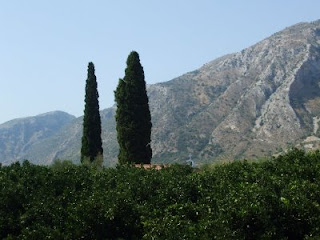
Driving through Sparti was shocking to us. They had no semaphores, the town was full of steep roads and the cars were packed together making it hard to move through. Or at least that's what we thought at the time. We heard they tried to implement traffic lights in the town, but that only made the situation worse. They also had some roundabouts (we were told that's what they were) which were pretty much poles in the middle of normal road intersection. The houses were the usual block like yellow model, since they never have significant snow to warrant tilted roofs and any color except yellow would probably be burned through by the relentless sun.
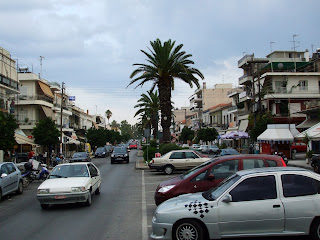
The cars are either small, and of all kinds, all pickup trucks, which are almost all Asian cars. Mitsubishi is a popular brand in Greece for trucks, although I have seen only about three Colt and three Lancer models around. Instead zillions of truck/van variations, from the ancient Canter model to the more modern L200. You can find a lot of Nissan, Toyota, some Ford and Isuzu, etc. In the area people seemed to love pickup trucks.
Greek villages are built like mountain villages, even those placed in valleys. The houses are packed together, with barely enough space between for cars to pass by each other and with no sidewalks. If driving through Sparti was a bit new and awkward, driving inside the village where my sister-in-law lived was hell! No straight roads, no markings anywhere. The convex mirrors that I sometimes saw installed in Romania in difficult mountain curves are popular even in flat valley Greek villages. During church days, a side of the road is used for parking so if two cars face each other, one of them must back up all the way to a larger portion or an intersection. Amazingly (for a Bucharest guy like myself), they hardly ever honk.
The logic behind it is that they built the houses in (and with) the rock of the mountain, obviously in the portions that were easiest to support a house, like flat and safe. They left space for two loaded donkeys to pass by each other, they didn't need more. In the ancient Greeks view, the roads had two lanes! Things were perfectly fine until all the nonsense with the cars came along. But why would they apply the same crowded style to their valley villages, I don't know.
I will not linger on the nearby Mystras. It is a ruined fortress on a mountain side full of foreign tourists. I made some quick photos and ran away. It was hot and I found it less than inspiring, although beautiful to look at for a few moments :)

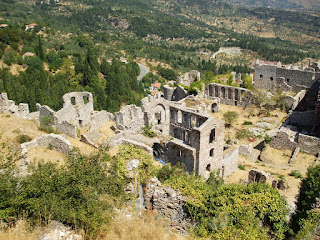
Kyparissi, Greece (4)
Oh, boy! If we were shocked by the roads so far, we were in for a surprise. The village of Kyparissi was over a mountain from Sparti and near the sea. The way there was carved into the rock and both steep and curvy. The same lack of safety installations or warning signs was apparent. We kind of got used to it, in a while, and then we entered the village. Imagine a place where your car has just enough place to squeeze through and where the main road has portions that allow for two cars to pass by, in the others, one must back up in steep, even tightly curved places to allow for the other to pass. How we haven't bumped, scratched, crashed our car is beyond me.
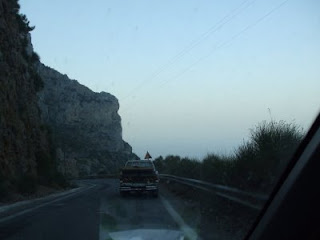

The village itself is nice to look at. Not much to do in it. It consists of houses covering a side of the mountain from the top down to the beach. Whatever space is left is covered in olive and carob trees. With the typical Greek nonchalance, the beach is not regulated in any way, nobody seems to clean it or the water and there are no tourist accommodations to be seen on it. The sea is light blue and very clear, so the combination of mountain, sea with some yachts on it and small houses is very beautiful.

What striked me, a guy used to the sandy beaches of Romania, is that the beach was small and full of rounded rock. I could barely walk on it (although, to be fair, Maria had no problems). There were no birds that I could see, no oyster shells, just a lot of wasps! The Greeks don't seem to mind, I even heard the idea that they enjoy rocks more, since they don't get into their bathing suits. After a first very unpleasant beach day, I found the solution: I would use my slippers on the beach and when entering the sea, then I would move them from my feet to my hands and use them to either support by head when floating around or as swimming accessories. It worked wonders and it allowed me to enjoy the sea.
The sea itself was very clear and very salty. When it entered my nose and eyes it stung to high heaven. I got used to it eventually. There were small fish swimming around and, if there were no waves, the water was very clean. However, when the waves came rolling in, they brought plastic bags, plastic cups, twigs and big red jellyfish! I noticed that if I let the waves bring this crap closer to the shore, it eventually got stuck in some places and the water was clean again in about an hour.
It was funny to see the fish jump from the water one after the other. One less attentive fish jumped right in my shoulder. He probably expected some warning sign that I was there, so maybe it wasn't a Greek fish! One day I noticed something red in the water. I thought of warning Maria, but then I saw the same thing on another wave of water, looking exactly the same. I thought it was a reflection or something until Maria shouted that something touched her. Swimming there I found that the waves brought jellyfish close to shore, big fist sized reddish-brown tentacled jellyfish that now I believe are of the species Pelagia noctiluca. I never seen them glow in the dark, but then again, I didn't go swimming at night either. I was right not to touch them, as they apparently are the stinging type.
While in Kyparissi I visited an abandoned "old village" which consisted of some old buildings that very few people lived in. It was like a good MMORPG map, people could learn a thing or two about how to make games wandering around there. I forgot to bring my camera that time, sorry. Then we went to a cabin higher up the mountain, which provided us with more beautiful scenery and more Greek road horror. Imagine an unpaved road full of broken rock that goes higher and higher, while the wheels of the car are centimeters away from free fall. Made a lot of plant pictures and I even photographed an eagle in the sky.

We also went to the Wine "Panigiri", which is Greek for festival, in the close village of Pistamata. We saw a lot of people in front of a church with lots of wine, we turned the car around and went back :) What did you expect? I am a software developer. If I'd had people skills I would have had some other job!
Other places we've seen are the town of Molaus and the citadel of Monevasia. The latter was a nice castle city at the edge of the sea, something like the Romanian Sighisoara, but with a lot more good taste and with the sea :) Took some pictures there, as well.




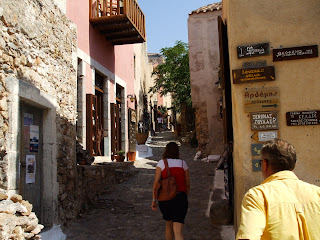
We spent a little over a week in Kyparissi, lazing around. I brought a few books with me, but they weren't all so interesting so I ended up watching Romanian satellite TV and eating a lot. It was like an advanced course in couch potatoing. I slept, I ate, I went to the beach (sometimes), I watched TV. I gained like 5 kilograms doing this :)
I promised to tell you about the Greek schooling system. Well, in order to get to a university you have to learn everything you've been taught in highschool. It makes sense. In order to help children to learn it, sometimes parents hire tutors, paying them for the service of upgrading their children's knowledge. Again, understandable. What is really nasty in Greece is that eveybody hires these tutors, so much that then entire educational system pretty much assumes the children will go to these "frontistirio". The demand is so great that the market is not controlled by the parents, but by the tutors. They get to teach and, if things don't work out, blame it on the child! All the time the parents are paying 5000-10000 euros per year for this crap! While it is nice to see Romania doesn't have the crappiest educational system on Earth (although we are working on it), I can't help feeling sorry for all those kids and their parents.
Next post will be about the trips around Sparti and the way home to my beloved computer! Yay! Coming up right after these commercials!
When I first heard my sister in law lived in Sparti, the modern Greek town built at the site of ancient Sparta, next to the medieval settlement of Mystras, I had expected to see myriads of ruins, tourist attractions, museums and so forth. Not that I like this kind of stuff, but if Romanians had a city in Sparta, they would quickly turn it into a tourist attraction, always crowded and nauseatingly full of people and garbage. Not the Greeks. They did have something organized at Mystras, which is
Anyway, we met with Maria's sister, went to her house-in-progress in a small village next to Sparti and tried to get accommodations. The house is not finished yet. It does have its walls in place, but there are no doors inside, no floors except the raw concrete and so, after spending a day there and sleeping for the night, we decided to relocate to Maria's brother's home, in Kyparissi. But not before I got acquainted with the local cuisine, visited Mystras and made some pictures of the place. It was necessary for me to shed off some preconceptions about Greece as well.
First of all, orange and grapefruit trees don't grow everywhere in Greece. Even if my sister in law's house lay next to an orange orchard, that wasn't really very common. Instead, olive trees were practically everywhere! I love grapefruit juice. I thought I would get tons of it, freshly squeezed from recently picked fruit. The Greeks don't like grapefruit much. I had to make due with the supermarket variety of juice, of which I think I used a significant percentage. When trying to buy it, a clerk warned us that that was not orange juice! To be fair, it wasn't fruit picking season, the oranges in the nearby orchard were still green, so maybe I just visited the place at the wrong time of the year. I think I would have had more fun in the winter.

Then, the food is not that spicy or original. Greek cuisine seems to orbit the suvlaki and gyros, which are medium sized chicken meat on a stick or wrapped in pita bread. Being used to shawarma and döner kebab in Bucharest, I found it banal. I also knew about tzatziki, which is a mixture of yoghurt, cucumbers and garlic. However, most people there were amazed of my willingness to order and then ingest large quantities of the stuff. The mousaka we also have in Romania. We ate a nice one at a road diner just after entering Greece, but from then on every restaurant we asked did not have it available. Also to note is the pastitio, which is like a lasagna made with normal pasta, not sheets of it.

The only spice worth mentioning is the Greek oregano, which they called rigani. Very aromatic and flagrantly different from the Italian sort. Also, if I had ever imagined Greek peasants selling cheap olives on the side of the road (like one would find in Romania), I was sadly disappointed. When leaving the country, we actually bought the olives from a supermarket, after trying a few and not finding any except in small jars.

Driving through Sparti was shocking to us. They had no semaphores, the town was full of steep roads and the cars were packed together making it hard to move through. Or at least that's what we thought at the time. We heard they tried to implement traffic lights in the town, but that only made the situation worse. They also had some roundabouts (we were told that's what they were) which were pretty much poles in the middle of normal road intersection. The houses were the usual block like yellow model, since they never have significant snow to warrant tilted roofs and any color except yellow would probably be burned through by the relentless sun.

The cars are either small, and of all kinds, all pickup trucks, which are almost all Asian cars. Mitsubishi is a popular brand in Greece for trucks, although I have seen only about three Colt and three Lancer models around. Instead zillions of truck/van variations, from the ancient Canter model to the more modern L200. You can find a lot of Nissan, Toyota, some Ford and Isuzu, etc. In the area people seemed to love pickup trucks.
Greek villages are built like mountain villages, even those placed in valleys. The houses are packed together, with barely enough space between for cars to pass by each other and with no sidewalks. If driving through Sparti was a bit new and awkward, driving inside the village where my sister-in-law lived was hell! No straight roads, no markings anywhere. The convex mirrors that I sometimes saw installed in Romania in difficult mountain curves are popular even in flat valley Greek villages. During church days, a side of the road is used for parking so if two cars face each other, one of them must back up all the way to a larger portion or an intersection. Amazingly (for a Bucharest guy like myself), they hardly ever honk.
The logic behind it is that they built the houses in (and with) the rock of the mountain, obviously in the portions that were easiest to support a house, like flat and safe. They left space for two loaded donkeys to pass by each other, they didn't need more. In the ancient Greeks view, the roads had two lanes! Things were perfectly fine until all the nonsense with the cars came along. But why would they apply the same crowded style to their valley villages, I don't know.
I will not linger on the nearby Mystras. It is a ruined fortress on a mountain side full of foreign tourists. I made some quick photos and ran away. It was hot and I found it less than inspiring, although beautiful to look at for a few moments :)


Kyparissi, Greece (4)
Oh, boy! If we were shocked by the roads so far, we were in for a surprise. The village of Kyparissi was over a mountain from Sparti and near the sea. The way there was carved into the rock and both steep and curvy. The same lack of safety installations or warning signs was apparent. We kind of got used to it, in a while, and then we entered the village. Imagine a place where your car has just enough place to squeeze through and where the main road has portions that allow for two cars to pass by, in the others, one must back up in steep, even tightly curved places to allow for the other to pass. How we haven't bumped, scratched, crashed our car is beyond me.


The village itself is nice to look at. Not much to do in it. It consists of houses covering a side of the mountain from the top down to the beach. Whatever space is left is covered in olive and carob trees. With the typical Greek nonchalance, the beach is not regulated in any way, nobody seems to clean it or the water and there are no tourist accommodations to be seen on it. The sea is light blue and very clear, so the combination of mountain, sea with some yachts on it and small houses is very beautiful.

What striked me, a guy used to the sandy beaches of Romania, is that the beach was small and full of rounded rock. I could barely walk on it (although, to be fair, Maria had no problems). There were no birds that I could see, no oyster shells, just a lot of wasps! The Greeks don't seem to mind, I even heard the idea that they enjoy rocks more, since they don't get into their bathing suits. After a first very unpleasant beach day, I found the solution: I would use my slippers on the beach and when entering the sea, then I would move them from my feet to my hands and use them to either support by head when floating around or as swimming accessories. It worked wonders and it allowed me to enjoy the sea.
The sea itself was very clear and very salty. When it entered my nose and eyes it stung to high heaven. I got used to it eventually. There were small fish swimming around and, if there were no waves, the water was very clean. However, when the waves came rolling in, they brought plastic bags, plastic cups, twigs and big red jellyfish! I noticed that if I let the waves bring this crap closer to the shore, it eventually got stuck in some places and the water was clean again in about an hour.
It was funny to see the fish jump from the water one after the other. One less attentive fish jumped right in my shoulder. He probably expected some warning sign that I was there, so maybe it wasn't a Greek fish! One day I noticed something red in the water. I thought of warning Maria, but then I saw the same thing on another wave of water, looking exactly the same. I thought it was a reflection or something until Maria shouted that something touched her. Swimming there I found that the waves brought jellyfish close to shore, big fist sized reddish-brown tentacled jellyfish that now I believe are of the species Pelagia noctiluca. I never seen them glow in the dark, but then again, I didn't go swimming at night either. I was right not to touch them, as they apparently are the stinging type.
While in Kyparissi I visited an abandoned "old village" which consisted of some old buildings that very few people lived in. It was like a good MMORPG map, people could learn a thing or two about how to make games wandering around there. I forgot to bring my camera that time, sorry. Then we went to a cabin higher up the mountain, which provided us with more beautiful scenery and more Greek road horror. Imagine an unpaved road full of broken rock that goes higher and higher, while the wheels of the car are centimeters away from free fall. Made a lot of plant pictures and I even photographed an eagle in the sky.

We also went to the Wine "Panigiri", which is Greek for festival, in the close village of Pistamata. We saw a lot of people in front of a church with lots of wine, we turned the car around and went back :) What did you expect? I am a software developer. If I'd had people skills I would have had some other job!
Other places we've seen are the town of Molaus and the citadel of Monevasia. The latter was a nice castle city at the edge of the sea, something like the Romanian Sighisoara, but with a lot more good taste and with the sea :) Took some pictures there, as well.





We spent a little over a week in Kyparissi, lazing around. I brought a few books with me, but they weren't all so interesting so I ended up watching Romanian satellite TV and eating a lot. It was like an advanced course in couch potatoing. I slept, I ate, I went to the beach (sometimes), I watched TV. I gained like 5 kilograms doing this :)
I promised to tell you about the Greek schooling system. Well, in order to get to a university you have to learn everything you've been taught in highschool. It makes sense. In order to help children to learn it, sometimes parents hire tutors, paying them for the service of upgrading their children's knowledge. Again, understandable. What is really nasty in Greece is that eveybody hires these tutors, so much that then entire educational system pretty much assumes the children will go to these "frontistirio". The demand is so great that the market is not controlled by the parents, but by the tutors. They get to teach and, if things don't work out, blame it on the child! All the time the parents are paying 5000-10000 euros per year for this crap! While it is nice to see Romania doesn't have the crappiest educational system on Earth (although we are working on it), I can't help feeling sorry for all those kids and their parents.
Next post will be about the trips around Sparti and the way home to my beloved computer! Yay! Coming up right after these commercials!




0 comments:
Post a Comment